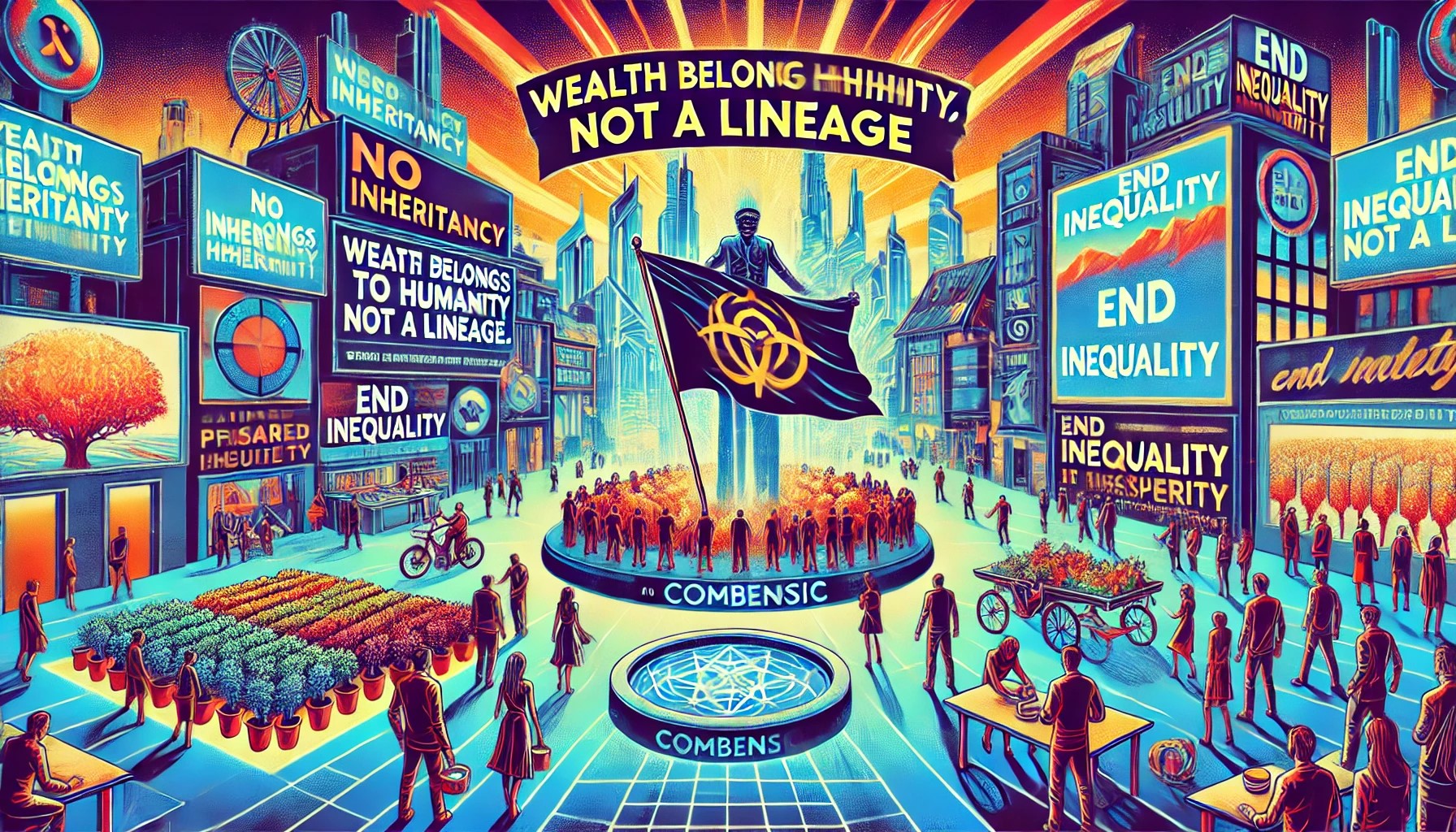Introduction
Throughout recorded history, human society has experienced countless struggles over power and wealth. From kings and emperors to modern financial magnates, individuals and families who held immense wealth and authority inevitably faced decline or collapse. These cycles have often brought war, betrayal, and destruction, exacerbating inequality and division within societies. Fundamentally, humanity’s desire for wealth and power stems from the pursuit of safety, freedom, happiness, health, and joy.
However, history and reality repeatedly demonstrate that relying on wealth and power alone cannot achieve true safety or happiness. Only by breaking the monopoly of wealth, eliminating barriers between people, and building a system of shared resources and mutual development can we achieve lasting happiness for individuals and lasting peace and prosperity for society as a whole.
Abolishing personal inheritance is a crucial step toward realizing this vision.
The Drawbacks of Personal Inheritance: The Backlash of Wealth and Power
The traditional system of inheritance allows wealth to pass down within families across generations. While this mechanism protects familial interests, it also creates significant societal challenges.
1. Wealth Concentration and Generational Monopolies
Inheritance leads to the accumulation of wealth within a few families, creating generational monopolies that widen the wealth gap. Resources remain concentrated in the hands of a few, solidifying social hierarchies and making it difficult for ordinary individuals to improve their status through effort.
2. Inequality of Opportunity
Heirs of enormous wealth often enjoy privileged resources without any effort, while the majority struggle to secure equal opportunities. This inequality weakens societal vitality and stifles overall creativity.
3. Resource Mismanagement and Inefficiency
Heirs may lack the skills to effectively manage inherited wealth, leading to waste or misallocation. If these resources were integrated into a socialized management system, they could be used more effectively to benefit the public.
4. Social Conflict and Division
The concentration of wealth exacerbates social tensions and inequality, further destabilizing society. History is rife with examples of revolutions, wars, and uprisings triggered by extreme disparities in wealth and unjust distribution of resources.
Humanity’s Ultimate Needs: Safety, Freedom, and Happiness
Wealth and power are not humanity’s ultimate goals. People pursue them in the hope of achieving safety, freedom, and happiness. Yet, history shows that the excessive concentration of wealth brings more anxiety and conflict rather than lasting happiness.
1. Wealth Cannot Guarantee Safety
Families possessing immense wealth often face heightened risks, including internal disputes, external threats, and public discontent. The more wealth one accumulates, the greater the accompanying anxiety and insecurity.
2. True Happiness Lies in Fairness and Harmony
Individual happiness is deeply tied to the overall societal environment. Only when resources are distributed more equitably, opportunities are made accessible, and divisions between people are minimized can true safety and happiness be realized.
3. Descendants Belong to the Human Family
While descendants are the biological continuation of individuals, from a broader perspective, they are members of the human family. If the Earth is considered a shared home, then personal wealth should also be seen as part of the collective resources of this family.
Rather than leaving an inheritance, descendants gain far more security and opportunity by benefiting from the mutual support of society. Social resources provide a far more sustainable and reliable foundation for their future than family wealth ever could.
The Path to Abolishing Personal Inheritance
In the framework of a Combenistic Society, abolishing personal inheritance is a groundbreaking innovation. It shifts wealth from private family ownership to shared societal resources, enabling more equitable distribution and efficient utilization.
1. Socializing Wealth to Promote Fairness
After an individual’s death, their wealth is transferred to the “Combenistic Entity,” which manages resources for public welfare, such as education, healthcare, and housing. This mechanism eliminates generational wealth monopolies and narrows the wealth gap.
2. Optimizing Resource Allocation for Social Development
By integrating inherited wealth into a socialized management system, resources can be directed toward meaningful areas such as innovation, infrastructure, and technological advancement, maximizing their societal value.
3. Encouraging Individual Creativity and Social Vitality
Abolishing inheritance reduces dependence on family wealth, motivating individuals to create their own value through effort. This enhances societal dynamism and prevents resource waste caused by reliance on inherited wealth.
4. Realizing Humanity’s Collective Interest
Transforming personal inheritance into public resources enhances the quality of life for all members of society. Everyone benefits from shared resources, achieving the ideal of “humanity as one.”
The Significance of Abolishing Personal Inheritance
Abolishing personal inheritance is not just an economic policy reform but also a profound shift in societal values. It embodies the following core principles:
- Building an Equitable Society: Eliminating generational wealth monopolies creates equal opportunities for all.
- Promoting Social Harmony: Reducing wealth inequality alleviates societal tensions, fostering lasting stability.
- Advancing Sustainable Development: Efficient resource sharing and distribution mechanisms ensure a sustainable future.
- Reshaping Human Values: Highlighting that true happiness stems from cooperation and mutual benefit, not possession and conflict.
Conclusion
History has repeatedly proven that the concentration of wealth and power cannot bring lasting safety or happiness; instead, it fuels endless conflict and turmoil. Abolishing personal inheritance offers a new possibility: transforming resources into shared societal assets and building a society centered on fairness and cooperation.
We must believe that a world without personal inheritance, yet brimming with opportunities and hope, is achievable and is the inevitable direction for humanity’s progress. When everyone can equally access society’s resources and support, the future will be one of genuine equity, prosperity, and sustainability. This is humanity’s most precious collective legacy.
取消个人遗产继承制度:迈向公平与繁荣的新社会
引言
自有历史记载以来,人类社会经历了无数的权力与财富争夺战。从帝王将相到现代金融巨头,掌控巨大财富和权力的个人与家族无一例外地走向过衰败或覆灭。这种循环往往伴随着战争、背叛、破坏等灾难,同时加剧了社会的不平等与对立。究其根本,人们对财富和权力的渴望,无非是为了追求安全、自由、幸福、健康和快乐。
然而,历史与现实一再表明,依赖财富和权力并不能带来真正的安全与幸福。只有打破财富垄断,消除人与人之间的隔阂,建立资源共享与共同发展的社会体系,才能实现每个人的长久幸福以及社会整体的和平与繁荣。
取消个人遗产继承制度,正是实现这一目标的关键一步。
个人遗产继承的弊端:财富与权力的反噬
传统的遗产继承制度允许财富在家庭内部代际传递,这一机制在维护家庭利益的同时,也带来了重大的社会问题。
1. 财富集中与代际垄断
遗产继承让财富不断积累在少数家庭手中,形成代际垄断,进一步拉大贫富差距。资源的高度集中使社会阶层固化,普通人很难通过自身努力实现阶层跃升。
2. 机会的不平等
继承巨额财富的后代无需付出努力便能享有优渥资源,而绝大多数人却难以获得公平的起点。这种不平等削弱了社会活力,限制了整体创造力的发挥。
3. 资源浪费与低效利用
遗产继承人可能缺乏管理财富的能力,导致资源被低效甚至错误地使用。而如果这些资源被纳入社会化管理体系,可以更好地用于公共福利,造福更多人。
4. 社会矛盾与对立
财富的集中加剧了社会矛盾,进一步引发社会不稳定。历史上的革命、战争和起义,往往与极端的贫富差距和资源分配不公直接相关。
人类的终极需求:安全、自由与幸福
财富和权力从来不是人类的终极目标。人们追求它们,仅仅是希望通过它们获得安全、自由与幸福。然而,历史证明,财富的过度集中不仅不能带来幸福,反而引发了更多的不安与冲突。
1. 财富不能带来安全
拥有巨大财富的家庭常常面临更大的风险,包括内部争斗、外部觊觎以及公众的不满。财富越多,随之而来的焦虑与不安也越大。
2. 幸福来源于公平与和谐的社会环境
个人的幸福与社会整体的环境密不可分。只有当资源分配更加公平、机会更加均等,人与人之间的隔阂和对立减少时,每个人才能获得真正的安全与幸福。
3. 子孙属于人类大家庭
尽管子孙是我们的血脉延续,但从更宏观的视角来看,他们同样是人类大家庭的一员。
与其留下遗产,不如通过共享社会资源为子孙提供更可靠的安全感与发展机会。他们获得的是全社会的互助与支持,而不仅仅是家族财富的保护。这种来自社会的帮助,比任何遗产都更加可持续,更能保障他们的未来。
取消个人遗产继承制度的解决之道
在共益社会的框架中,取消个人遗产继承制度是一项开创性的制度变革。它将财富从家族垄断中解放出来,转化为全社会的共享资源,从而实现更公平的分配和更高效的利用。
1. 财富社会化,促进公平
个人去世后,其遗产将归入“共益体”管理,用于支持教育、医疗、住房等公共福利。通过这一机制,可以从根本上消除代际财富垄断,缩小贫富差距。
2. 优化资源配置,推动社会发展
遗产进入社会化管理体系后,可被用于更有意义的领域,如支持创新创业、改善基础设施、推动技术研发等,从而最大化其社会价值。
3. 激发个人创造力与社会活力
取消遗产继承减少了对财富的依赖,鼓励个人通过努力创造自身价值。这不仅增强了社会的整体活力,也避免了因依赖继承而导致的资源浪费。
4. 实现人类共同利益
将个人遗产转化为社会公共资源,可以显著提高全体社会成员的生活质量。每个人都将从社会资源中受益,真正实现“人类一体”的理想。
推动取消遗产继承制度的意义
取消个人遗产继承制度不仅是一项经济政策的变革,更是一场社会价值观的重塑。它承载了以下核心价值:
- 建立公平社会:通过消除代际财富垄断,为所有人创造平等的机会。
- 促进社会和谐:减少因财富不平等导致的矛盾与对立,推动社会长久稳定。
- 推动可持续发展:通过高效的资源共享与分配机制,创造一个可持续发展的社会环境。
- 重塑人类价值观:让人们认识到,真正的幸福来源于合作与共益,而非占有与对抗。
结语
人类社会的历史反复证明,财富与权力的集中并不能带来持久的安全与幸福,反而引发了无休止的冲突与动荡。而取消个人遗产继承制度,为我们提供了一种新的可能:通过将资源社会化,建立一个以公平与共享为核心的社会。
**我们需要相信,一个没有遗产继承但充满机会与希望的社会,不仅是可行的,也是人类发展的必然方向。**当每个人都能平等地享受社会资源与支持时,未来将是一个真正公平、繁荣与可持续的世界。这,才是我们最珍贵的共同遗产。
